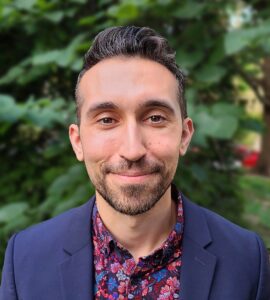 Associate Professor Daniel Aaron has accepted a new position at the S.J. Quinney College of Law and will begin teaching this fall. With his expertise in health law—Aaron earned his MD from the Boston University Chobanian & Avedisian School of Medicine before receiving his JD at Harvard Law School—S.J. Quinney had the values he was looking for.
Associate Professor Daniel Aaron has accepted a new position at the S.J. Quinney College of Law and will begin teaching this fall. With his expertise in health law—Aaron earned his MD from the Boston University Chobanian & Avedisian School of Medicine before receiving his JD at Harvard Law School—S.J. Quinney had the values he was looking for.
“I grew up around a lot of illness in my family. When I later went to medical school, I saw firsthand how families were coping with illness and how our medical and public health systems were often not meeting their needs,” Aaron recalls. “So I shifted gears toward law, which led me to study the legal and structural determinants of health. S.J. Quinney was a perfect fit for that given the strong health law focus and the passion of the faculty and students toward making our society more just.”
During his first year at S.J. Quinney, Aaron will be teaching two classes and is looking forward to making tort law applicable to students.
“Torts are about people who have been hurt (usually physically) seeking help in court,” he says. “Tort law often takes a back seat to more splashy areas of law like constitutional law, but tort cases can have a big impact for victims and drive structural change in consumer protection, environmental pollution, and transportation safety.”
Aaron says he is also excited to get to know the students this fall.
“I’ve heard great things about them, which means I’ll have to bring some challenging hypotheticals that make them think,” he says. “I hope they’re ready!”
Though he’s only been at the University of Utah for about a month, Aaron says his favorite thing so far is the people.
“Some faculty I met at other law schools had a competitive aura. On the other hand, the S.J. Quinney community is down-to-earth, loving, and supportive,” he says. “People seem in sync. They’re on the same team, and we can build things together.”
Most passionate about law’s power to drive change, Aaron says people stand amid intersecting crises of health, climate change, and inequality.
“If harnessed, law can create tools for alleviating these social ills. On the other hand, law often works invisibly (beyond the public eye) and is susceptible to power,” he says. “The centuries-long struggle for a more just society may be able to inform how to curb law’s harms and secure its benefits.”
When he’s not teaching law, Aaron enjoys hiking, playing volleyball and tennis, reading, writing, and listening to podcasts.
“I’m also a little bit of a gamer—just a little, I swear,” he says. “In fact, I’m designing a law-themed board game.”
